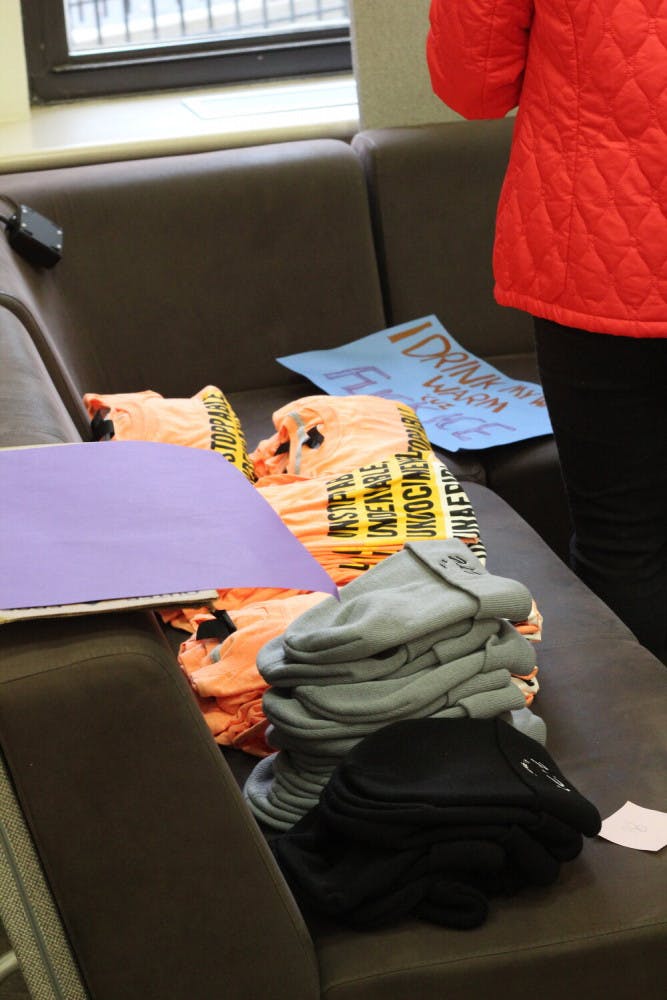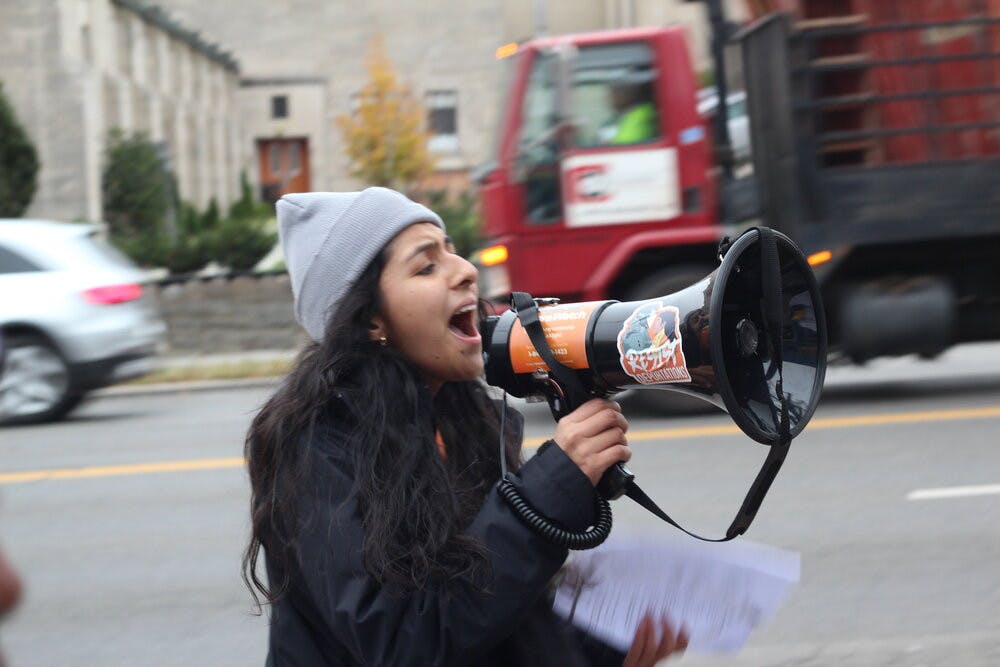BY: ISIS AMUSA
A sea of umbrellas cover huddled activists, "dreamers" and allies decorated with posters and passionate expressions as they clap their numb hands to the sounds of distant drums.
Chants like "sin papeles! Sin miedo!" reverberate up the steps of the Supreme Court as police stare down at them.
American University students first gathered for their walkout that morning in Mary Graydon Center around 8:30 a.m. They passed out United We Dream long-sleeve shirts that read "unstoppable, undeniable, undocumented, unafraid!" and "home is here" beanies. Eventually everyone was led outside for their march to Tenleytown Metro and ultimately the Supreme Court.

Photo by: Isis Amusa
Senior Romina Martin first spoke to her friend Luz Chavez, a Deferred Action for Childhood Arrivals recipient and UWD member about organizing a walkout and rally at AU.
"The uncertainty of your status and constant fear of deportation has the ability to cause very serious mental health consequences and I wish more people realized that. Legality doesn't always equal morality," Martin said.
Martin previously served on the e-board of the League of United Latin American Citizens her sophomore year and was quick to reach out to LULAC president Guadalupe Mabry about potential plans.
Mabry began reaching out to other student organizations and created a caucus on Nov. 3 where a panel of two DACA recipients, one undocumented youth and an ally spoke about the rallies they were organizing at their respective schools. Soon, the Asian American Student Union, the Latinx and American Student Organization, the South Asian Student Association, No Lost Generation and AU College Democrats joined the coalition of organizers.
Martin says the walkout was a big "team effort" with every organization working on outreach and tabling in the week leading up to the walkout.
Upon arrival, students listened to several speakers below the steps of the Supreme Court outside as the justices listened to three cases on the inside.
The three oral arguments called for the continuation of DACA, a program created by President Barack Obama in 2012 that shields undocumented immigrants brought to the country before age 16 from deportation and allows them to attend school or work.
To qualify, people must demonstrate that they've committed no serious crimes, that they are under 30, that they've lived in the United States for at least five years and have graduated from high school or obtained their G.E.D. certificate, according to the New York Times. Once proven, recipients earn DACA status for two years before it must be renewed.
In 2017 however, President Donald Trump announced he was terminating DACA. Those already under DACA could keep their status and renew it but no new applications for DACA would be accepted.
President Trump claimed the program's creation was "unconstitutional" and that former President Obama did not have the executive power to create it, despite it not providing a "path to citizenship," according to Vox.
Many of the people in DACA, no longer very young, are far from "angels." Some are very tough, hardened criminals. President Obama said he had no legal right to sign order, but would anyway. If Supreme Court remedies with overturn, a deal will be made with Dems for them to stay!
— Donald J. Trump (@realDonaldTrump) November 12, 2019
Though there is the question of whether or not the highest court in the nation has the power to review Trump's decision to terminate DACA, the three cases challenge whether his administration has provided sufficient reasoning for its termination.
"This is not about the law," Justice Sonia Sotomayor said on Tuesday, according to The New York Times. "This is about our choice to destroy lives."
If DACA is terminated almost 700,000 undocumented students and immigrants will lose their DACA status making them more vulnerable to detention centers and possible deportation, according to the New York Times.
The highly intersectional lineup of speakers emphasized this impact along with the impacts of U.S. immigration policy in general. Representatives from "Here is Home" marched over 200 miles from New York to Washington D.C., Speaker Nancy Pelosi (D-Calif.), NAACP President and CEO Derrick Johnson and many others all spoke to the crowd.
Johnson emphasized that immigration is a black and African issue as well and that the NAACP, the oldest and largest civil rights organization in the country, will continue to fight for these issues.
"There is no reality of fulfilling this democratic dream if we don't allow many of you in this crowd to fully participate based on a promise this nation gave you," Johnson said in his speech. "And just like the Dred Scott decision in the 1800s that told black folks that you had no rights that white folks were bound to uphold, we stand here to say that is a lie then, that is a lie today and that when this nation makes a promise they must uphold it and when they don't we will fight to win. When we fight we win!"
"An attack on any community of color is an attack on all communities of color." @DerrickNAACP delivers remarks at yesterday's DACA Rally https://t.co/t9RdmcgXgK
— NAACP (@NAACP) November 13, 2019
Despite the Supreme Court's conservative majority, many are still hopeful that they will win.
Martin, who immigrated from Lima, Peru, led an immigration-focused Alternative Break trip this past spring to McAllen, TX and currently works for the Catholic Charities Legal Services in Gaithersburg, MD. Martin is extremely passionate about these issues but understands DACA is just the beginning.
"Despite our challenges, we were blessed to have obtained citizenship and we know that is not the case for many people," Martin said. "While programs like DACA and TPS help many undocumented folks, they are not the solution to the problem. We need pathways to citizenship for these folks and we need it now."

Photo by: Isis Amusa
Though Martin expected more students to participate, she is "grateful to those who did attend." She hopes students at AU continue to advocate for undocumented immigrants and continue to spread awareness about issues and policies surrounding the undocumented community.
The justices are set to make a decision in early 2020.


